Business Law Report: Analysis of Sales of Goods and Services Contracts
VerifiedAdded on 2023/01/05
|11
|3979
|39
Report
AI Summary
This report provides a comprehensive analysis of business law, specifically focusing on the legal rules governing the sale of goods and services. It examines implied terms within sales contracts, statutory provisions related to the transfer of possession and property, and the remedies available to both sellers and buyers in cases of breach or defect. The report includes a detailed case study involving a faulty television set purchased by Mr. John, exploring the application of product liability statutory provisions. It covers consumer rights, warranty claims, and the responsibilities of both the seller (departmental store) and the manufacturer. The analysis delves into the importance of contracts, after-sales services, and the role of consumer courts in resolving disputes. The report emphasizes the importance of understanding consumer rights and the legal recourse available to buyers when goods are defective or fail to meet expected standards.
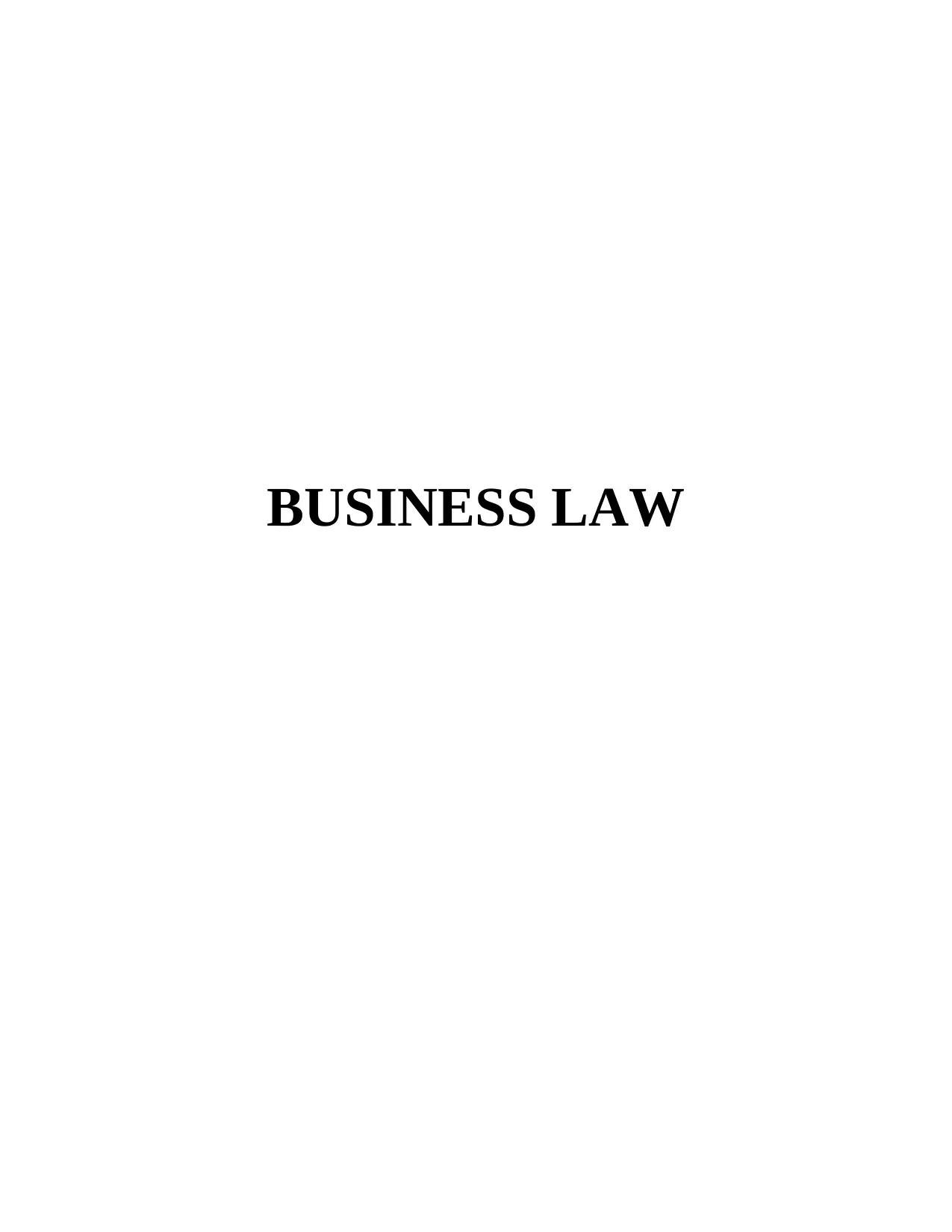
BUSINESS LAW
Paraphrase This Document
Need a fresh take? Get an instant paraphrase of this document with our AI Paraphraser
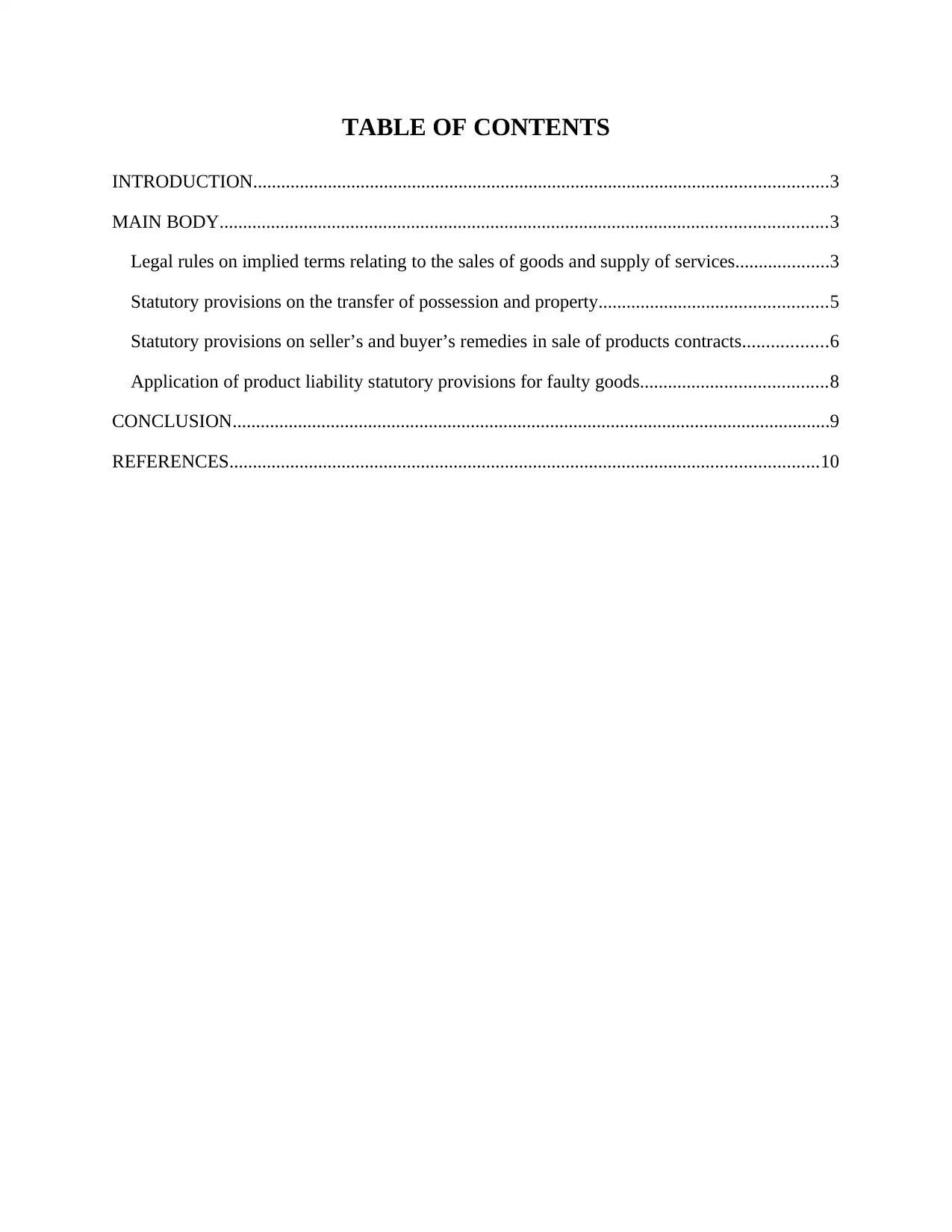
TABLE OF CONTENTS
INTRODUCTION...........................................................................................................................3
MAIN BODY..................................................................................................................................3
Legal rules on implied terms relating to the sales of goods and supply of services....................3
Statutory provisions on the transfer of possession and property.................................................5
Statutory provisions on seller’s and buyer’s remedies in sale of products contracts..................6
Application of product liability statutory provisions for faulty goods........................................8
CONCLUSION................................................................................................................................9
REFERENCES..............................................................................................................................10
INTRODUCTION...........................................................................................................................3
MAIN BODY..................................................................................................................................3
Legal rules on implied terms relating to the sales of goods and supply of services....................3
Statutory provisions on the transfer of possession and property.................................................5
Statutory provisions on seller’s and buyer’s remedies in sale of products contracts..................6
Application of product liability statutory provisions for faulty goods........................................8
CONCLUSION................................................................................................................................9
REFERENCES..............................................................................................................................10
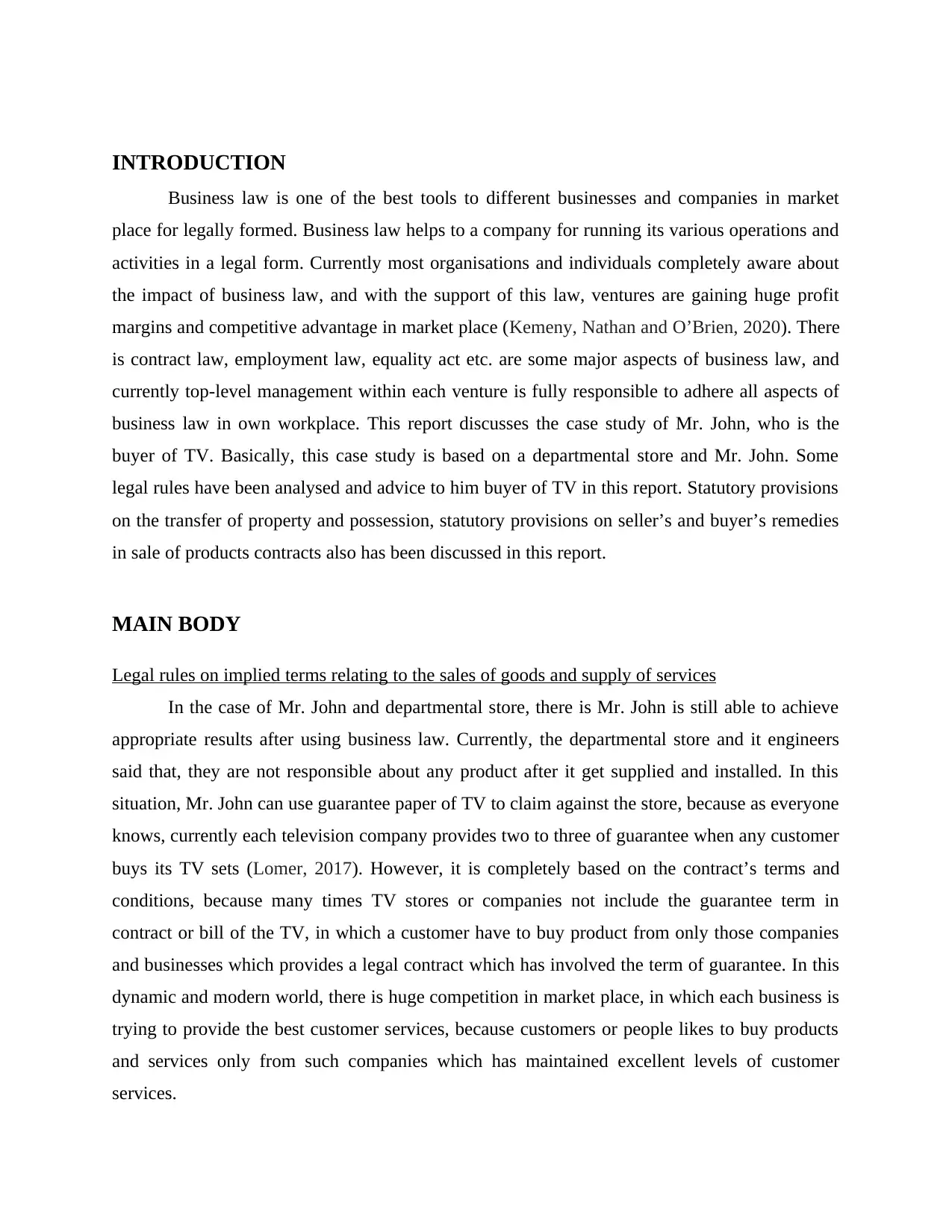
INTRODUCTION
Business law is one of the best tools to different businesses and companies in market
place for legally formed. Business law helps to a company for running its various operations and
activities in a legal form. Currently most organisations and individuals completely aware about
the impact of business law, and with the support of this law, ventures are gaining huge profit
margins and competitive advantage in market place (Kemeny, Nathan and O’Brien, 2020). There
is contract law, employment law, equality act etc. are some major aspects of business law, and
currently top-level management within each venture is fully responsible to adhere all aspects of
business law in own workplace. This report discusses the case study of Mr. John, who is the
buyer of TV. Basically, this case study is based on a departmental store and Mr. John. Some
legal rules have been analysed and advice to him buyer of TV in this report. Statutory provisions
on the transfer of property and possession, statutory provisions on seller’s and buyer’s remedies
in sale of products contracts also has been discussed in this report.
MAIN BODY
Legal rules on implied terms relating to the sales of goods and supply of services
In the case of Mr. John and departmental store, there is Mr. John is still able to achieve
appropriate results after using business law. Currently, the departmental store and it engineers
said that, they are not responsible about any product after it get supplied and installed. In this
situation, Mr. John can use guarantee paper of TV to claim against the store, because as everyone
knows, currently each television company provides two to three of guarantee when any customer
buys its TV sets (Lomer, 2017). However, it is completely based on the contract’s terms and
conditions, because many times TV stores or companies not include the guarantee term in
contract or bill of the TV, in which a customer have to buy product from only those companies
and businesses which provides a legal contract which has involved the term of guarantee. In this
dynamic and modern world, there is huge competition in market place, in which each business is
trying to provide the best customer services, because customers or people likes to buy products
and services only from such companies which has maintained excellent levels of customer
services.
Business law is one of the best tools to different businesses and companies in market
place for legally formed. Business law helps to a company for running its various operations and
activities in a legal form. Currently most organisations and individuals completely aware about
the impact of business law, and with the support of this law, ventures are gaining huge profit
margins and competitive advantage in market place (Kemeny, Nathan and O’Brien, 2020). There
is contract law, employment law, equality act etc. are some major aspects of business law, and
currently top-level management within each venture is fully responsible to adhere all aspects of
business law in own workplace. This report discusses the case study of Mr. John, who is the
buyer of TV. Basically, this case study is based on a departmental store and Mr. John. Some
legal rules have been analysed and advice to him buyer of TV in this report. Statutory provisions
on the transfer of property and possession, statutory provisions on seller’s and buyer’s remedies
in sale of products contracts also has been discussed in this report.
MAIN BODY
Legal rules on implied terms relating to the sales of goods and supply of services
In the case of Mr. John and departmental store, there is Mr. John is still able to achieve
appropriate results after using business law. Currently, the departmental store and it engineers
said that, they are not responsible about any product after it get supplied and installed. In this
situation, Mr. John can use guarantee paper of TV to claim against the store, because as everyone
knows, currently each television company provides two to three of guarantee when any customer
buys its TV sets (Lomer, 2017). However, it is completely based on the contract’s terms and
conditions, because many times TV stores or companies not include the guarantee term in
contract or bill of the TV, in which a customer have to buy product from only those companies
and businesses which provides a legal contract which has involved the term of guarantee. In this
dynamic and modern world, there is huge competition in market place, in which each business is
trying to provide the best customer services, because customers or people likes to buy products
and services only from such companies which has maintained excellent levels of customer
services.
⊘ This is a preview!⊘
Do you want full access?
Subscribe today to unlock all pages.

Trusted by 1+ million students worldwide
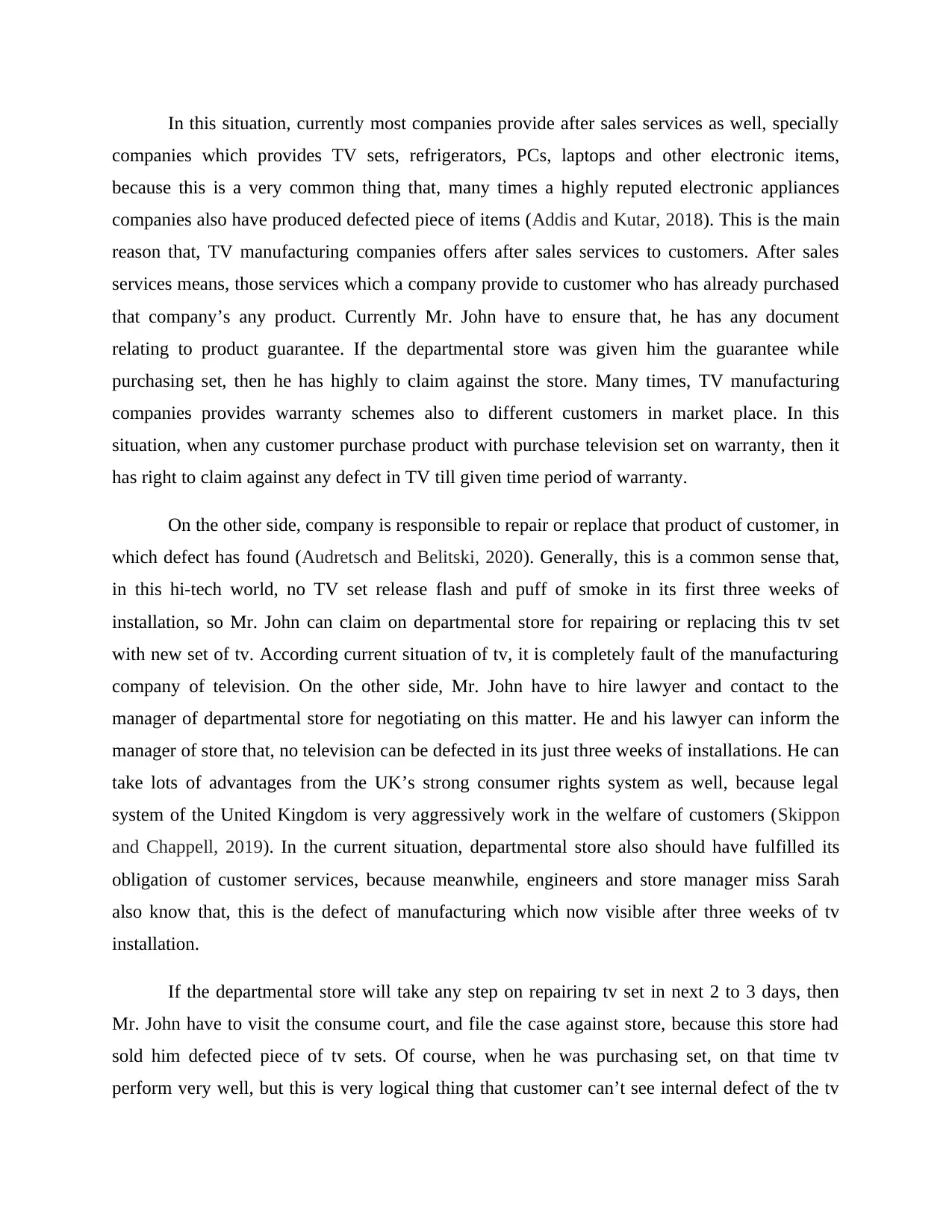
In this situation, currently most companies provide after sales services as well, specially
companies which provides TV sets, refrigerators, PCs, laptops and other electronic items,
because this is a very common thing that, many times a highly reputed electronic appliances
companies also have produced defected piece of items (Addis and Kutar, 2018). This is the main
reason that, TV manufacturing companies offers after sales services to customers. After sales
services means, those services which a company provide to customer who has already purchased
that company’s any product. Currently Mr. John have to ensure that, he has any document
relating to product guarantee. If the departmental store was given him the guarantee while
purchasing set, then he has highly to claim against the store. Many times, TV manufacturing
companies provides warranty schemes also to different customers in market place. In this
situation, when any customer purchase product with purchase television set on warranty, then it
has right to claim against any defect in TV till given time period of warranty.
On the other side, company is responsible to repair or replace that product of customer, in
which defect has found (Audretsch and Belitski, 2020). Generally, this is a common sense that,
in this hi-tech world, no TV set release flash and puff of smoke in its first three weeks of
installation, so Mr. John can claim on departmental store for repairing or replacing this tv set
with new set of tv. According current situation of tv, it is completely fault of the manufacturing
company of television. On the other side, Mr. John have to hire lawyer and contact to the
manager of departmental store for negotiating on this matter. He and his lawyer can inform the
manager of store that, no television can be defected in its just three weeks of installations. He can
take lots of advantages from the UK’s strong consumer rights system as well, because legal
system of the United Kingdom is very aggressively work in the welfare of customers (Skippon
and Chappell, 2019). In the current situation, departmental store also should have fulfilled its
obligation of customer services, because meanwhile, engineers and store manager miss Sarah
also know that, this is the defect of manufacturing which now visible after three weeks of tv
installation.
If the departmental store will take any step on repairing tv set in next 2 to 3 days, then
Mr. John have to visit the consume court, and file the case against store, because this store had
sold him defected piece of tv sets. Of course, when he was purchasing set, on that time tv
perform very well, but this is very logical thing that customer can’t see internal defect of the tv
companies which provides TV sets, refrigerators, PCs, laptops and other electronic items,
because this is a very common thing that, many times a highly reputed electronic appliances
companies also have produced defected piece of items (Addis and Kutar, 2018). This is the main
reason that, TV manufacturing companies offers after sales services to customers. After sales
services means, those services which a company provide to customer who has already purchased
that company’s any product. Currently Mr. John have to ensure that, he has any document
relating to product guarantee. If the departmental store was given him the guarantee while
purchasing set, then he has highly to claim against the store. Many times, TV manufacturing
companies provides warranty schemes also to different customers in market place. In this
situation, when any customer purchase product with purchase television set on warranty, then it
has right to claim against any defect in TV till given time period of warranty.
On the other side, company is responsible to repair or replace that product of customer, in
which defect has found (Audretsch and Belitski, 2020). Generally, this is a common sense that,
in this hi-tech world, no TV set release flash and puff of smoke in its first three weeks of
installation, so Mr. John can claim on departmental store for repairing or replacing this tv set
with new set of tv. According current situation of tv, it is completely fault of the manufacturing
company of television. On the other side, Mr. John have to hire lawyer and contact to the
manager of departmental store for negotiating on this matter. He and his lawyer can inform the
manager of store that, no television can be defected in its just three weeks of installations. He can
take lots of advantages from the UK’s strong consumer rights system as well, because legal
system of the United Kingdom is very aggressively work in the welfare of customers (Skippon
and Chappell, 2019). In the current situation, departmental store also should have fulfilled its
obligation of customer services, because meanwhile, engineers and store manager miss Sarah
also know that, this is the defect of manufacturing which now visible after three weeks of tv
installation.
If the departmental store will take any step on repairing tv set in next 2 to 3 days, then
Mr. John have to visit the consume court, and file the case against store, because this store had
sold him defected piece of tv sets. Of course, when he was purchasing set, on that time tv
perform very well, but this is very logical thing that customer can’t see internal defect of the tv
Paraphrase This Document
Need a fresh take? Get an instant paraphrase of this document with our AI Paraphraser
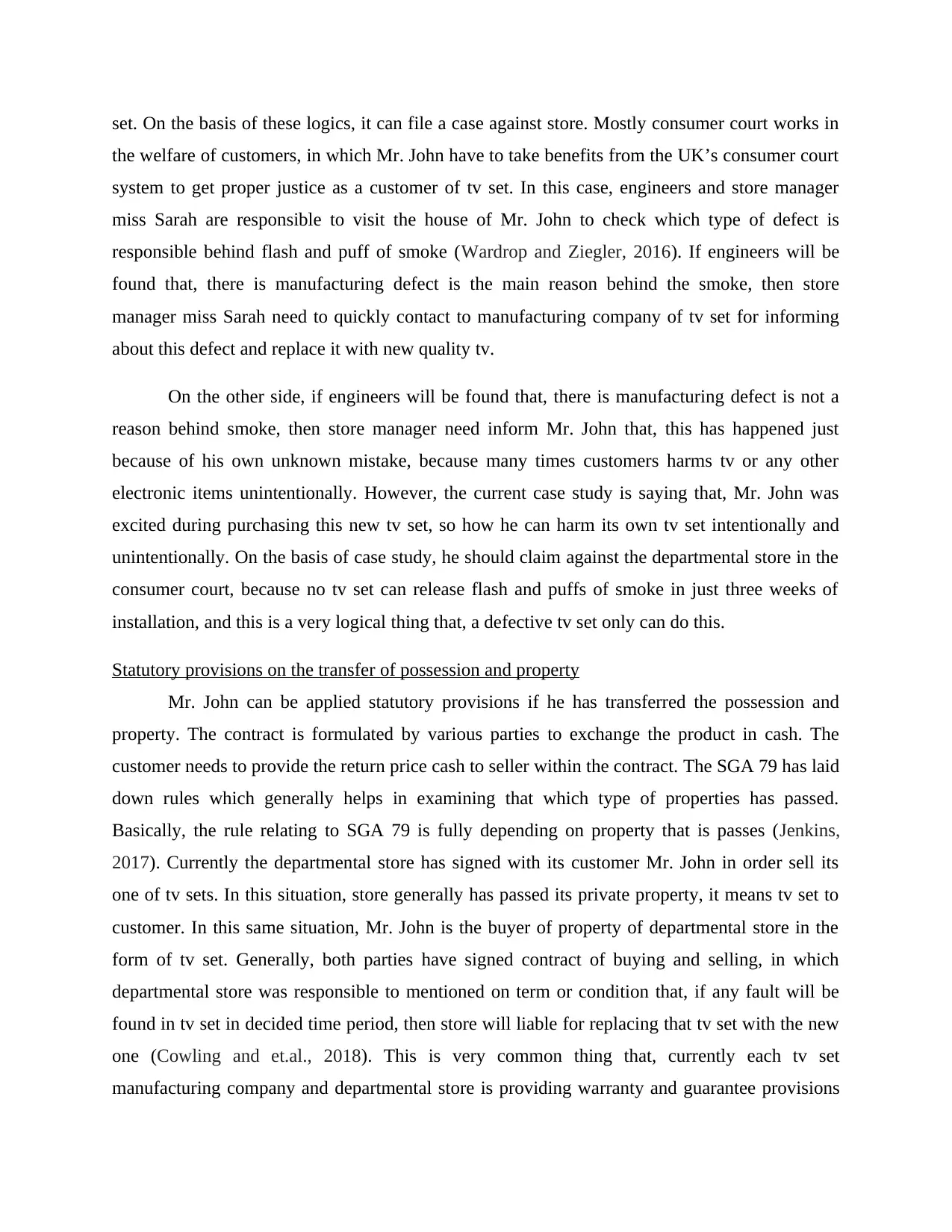
set. On the basis of these logics, it can file a case against store. Mostly consumer court works in
the welfare of customers, in which Mr. John have to take benefits from the UK’s consumer court
system to get proper justice as a customer of tv set. In this case, engineers and store manager
miss Sarah are responsible to visit the house of Mr. John to check which type of defect is
responsible behind flash and puff of smoke (Wardrop and Ziegler, 2016). If engineers will be
found that, there is manufacturing defect is the main reason behind the smoke, then store
manager miss Sarah need to quickly contact to manufacturing company of tv set for informing
about this defect and replace it with new quality tv.
On the other side, if engineers will be found that, there is manufacturing defect is not a
reason behind smoke, then store manager need inform Mr. John that, this has happened just
because of his own unknown mistake, because many times customers harms tv or any other
electronic items unintentionally. However, the current case study is saying that, Mr. John was
excited during purchasing this new tv set, so how he can harm its own tv set intentionally and
unintentionally. On the basis of case study, he should claim against the departmental store in the
consumer court, because no tv set can release flash and puffs of smoke in just three weeks of
installation, and this is a very logical thing that, a defective tv set only can do this.
Statutory provisions on the transfer of possession and property
Mr. John can be applied statutory provisions if he has transferred the possession and
property. The contract is formulated by various parties to exchange the product in cash. The
customer needs to provide the return price cash to seller within the contract. The SGA 79 has laid
down rules which generally helps in examining that which type of properties has passed.
Basically, the rule relating to SGA 79 is fully depending on property that is passes (Jenkins,
2017). Currently the departmental store has signed with its customer Mr. John in order sell its
one of tv sets. In this situation, store generally has passed its private property, it means tv set to
customer. In this same situation, Mr. John is the buyer of property of departmental store in the
form of tv set. Generally, both parties have signed contract of buying and selling, in which
departmental store was responsible to mentioned on term or condition that, if any fault will be
found in tv set in decided time period, then store will liable for replacing that tv set with the new
one (Cowling and et.al., 2018). This is very common thing that, currently each tv set
manufacturing company and departmental store is providing warranty and guarantee provisions
the welfare of customers, in which Mr. John have to take benefits from the UK’s consumer court
system to get proper justice as a customer of tv set. In this case, engineers and store manager
miss Sarah are responsible to visit the house of Mr. John to check which type of defect is
responsible behind flash and puff of smoke (Wardrop and Ziegler, 2016). If engineers will be
found that, there is manufacturing defect is the main reason behind the smoke, then store
manager miss Sarah need to quickly contact to manufacturing company of tv set for informing
about this defect and replace it with new quality tv.
On the other side, if engineers will be found that, there is manufacturing defect is not a
reason behind smoke, then store manager need inform Mr. John that, this has happened just
because of his own unknown mistake, because many times customers harms tv or any other
electronic items unintentionally. However, the current case study is saying that, Mr. John was
excited during purchasing this new tv set, so how he can harm its own tv set intentionally and
unintentionally. On the basis of case study, he should claim against the departmental store in the
consumer court, because no tv set can release flash and puffs of smoke in just three weeks of
installation, and this is a very logical thing that, a defective tv set only can do this.
Statutory provisions on the transfer of possession and property
Mr. John can be applied statutory provisions if he has transferred the possession and
property. The contract is formulated by various parties to exchange the product in cash. The
customer needs to provide the return price cash to seller within the contract. The SGA 79 has laid
down rules which generally helps in examining that which type of properties has passed.
Basically, the rule relating to SGA 79 is fully depending on property that is passes (Jenkins,
2017). Currently the departmental store has signed with its customer Mr. John in order sell its
one of tv sets. In this situation, store generally has passed its private property, it means tv set to
customer. In this same situation, Mr. John is the buyer of property of departmental store in the
form of tv set. Generally, both parties have signed contract of buying and selling, in which
departmental store was responsible to mentioned on term or condition that, if any fault will be
found in tv set in decided time period, then store will liable for replacing that tv set with the new
one (Cowling and et.al., 2018). This is very common thing that, currently each tv set
manufacturing company and departmental store is providing warranty and guarantee provisions
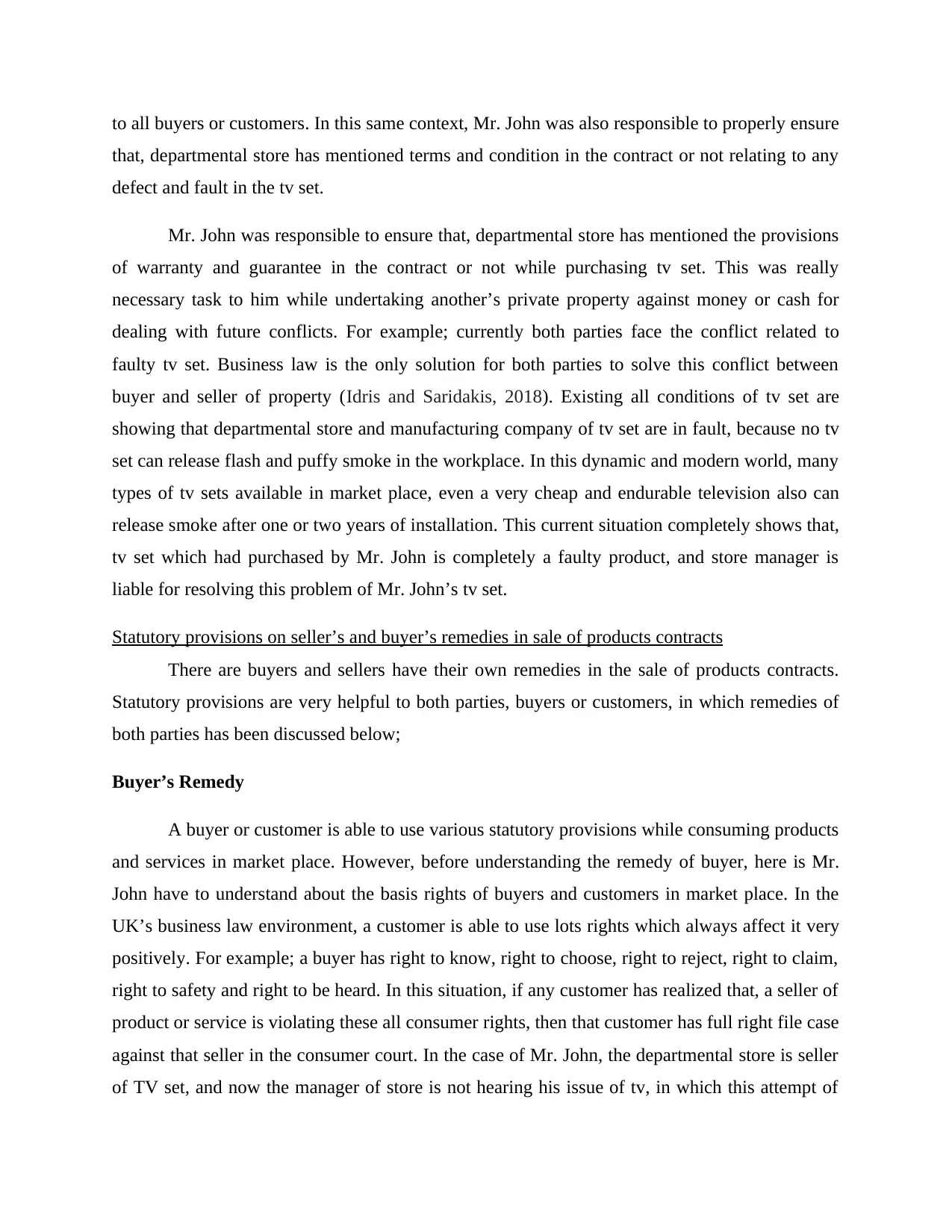
to all buyers or customers. In this same context, Mr. John was also responsible to properly ensure
that, departmental store has mentioned terms and condition in the contract or not relating to any
defect and fault in the tv set.
Mr. John was responsible to ensure that, departmental store has mentioned the provisions
of warranty and guarantee in the contract or not while purchasing tv set. This was really
necessary task to him while undertaking another’s private property against money or cash for
dealing with future conflicts. For example; currently both parties face the conflict related to
faulty tv set. Business law is the only solution for both parties to solve this conflict between
buyer and seller of property (Idris and Saridakis, 2018). Existing all conditions of tv set are
showing that departmental store and manufacturing company of tv set are in fault, because no tv
set can release flash and puffy smoke in the workplace. In this dynamic and modern world, many
types of tv sets available in market place, even a very cheap and endurable television also can
release smoke after one or two years of installation. This current situation completely shows that,
tv set which had purchased by Mr. John is completely a faulty product, and store manager is
liable for resolving this problem of Mr. John’s tv set.
Statutory provisions on seller’s and buyer’s remedies in sale of products contracts
There are buyers and sellers have their own remedies in the sale of products contracts.
Statutory provisions are very helpful to both parties, buyers or customers, in which remedies of
both parties has been discussed below;
Buyer’s Remedy
A buyer or customer is able to use various statutory provisions while consuming products
and services in market place. However, before understanding the remedy of buyer, here is Mr.
John have to understand about the basis rights of buyers and customers in market place. In the
UK’s business law environment, a customer is able to use lots rights which always affect it very
positively. For example; a buyer has right to know, right to choose, right to reject, right to claim,
right to safety and right to be heard. In this situation, if any customer has realized that, a seller of
product or service is violating these all consumer rights, then that customer has full right file case
against that seller in the consumer court. In the case of Mr. John, the departmental store is seller
of TV set, and now the manager of store is not hearing his issue of tv, in which this attempt of
that, departmental store has mentioned terms and condition in the contract or not relating to any
defect and fault in the tv set.
Mr. John was responsible to ensure that, departmental store has mentioned the provisions
of warranty and guarantee in the contract or not while purchasing tv set. This was really
necessary task to him while undertaking another’s private property against money or cash for
dealing with future conflicts. For example; currently both parties face the conflict related to
faulty tv set. Business law is the only solution for both parties to solve this conflict between
buyer and seller of property (Idris and Saridakis, 2018). Existing all conditions of tv set are
showing that departmental store and manufacturing company of tv set are in fault, because no tv
set can release flash and puffy smoke in the workplace. In this dynamic and modern world, many
types of tv sets available in market place, even a very cheap and endurable television also can
release smoke after one or two years of installation. This current situation completely shows that,
tv set which had purchased by Mr. John is completely a faulty product, and store manager is
liable for resolving this problem of Mr. John’s tv set.
Statutory provisions on seller’s and buyer’s remedies in sale of products contracts
There are buyers and sellers have their own remedies in the sale of products contracts.
Statutory provisions are very helpful to both parties, buyers or customers, in which remedies of
both parties has been discussed below;
Buyer’s Remedy
A buyer or customer is able to use various statutory provisions while consuming products
and services in market place. However, before understanding the remedy of buyer, here is Mr.
John have to understand about the basis rights of buyers and customers in market place. In the
UK’s business law environment, a customer is able to use lots rights which always affect it very
positively. For example; a buyer has right to know, right to choose, right to reject, right to claim,
right to safety and right to be heard. In this situation, if any customer has realized that, a seller of
product or service is violating these all consumer rights, then that customer has full right file case
against that seller in the consumer court. In the case of Mr. John, the departmental store is seller
of TV set, and now the manager of store is not hearing his issue of tv, in which this attempt of
⊘ This is a preview!⊘
Do you want full access?
Subscribe today to unlock all pages.

Trusted by 1+ million students worldwide
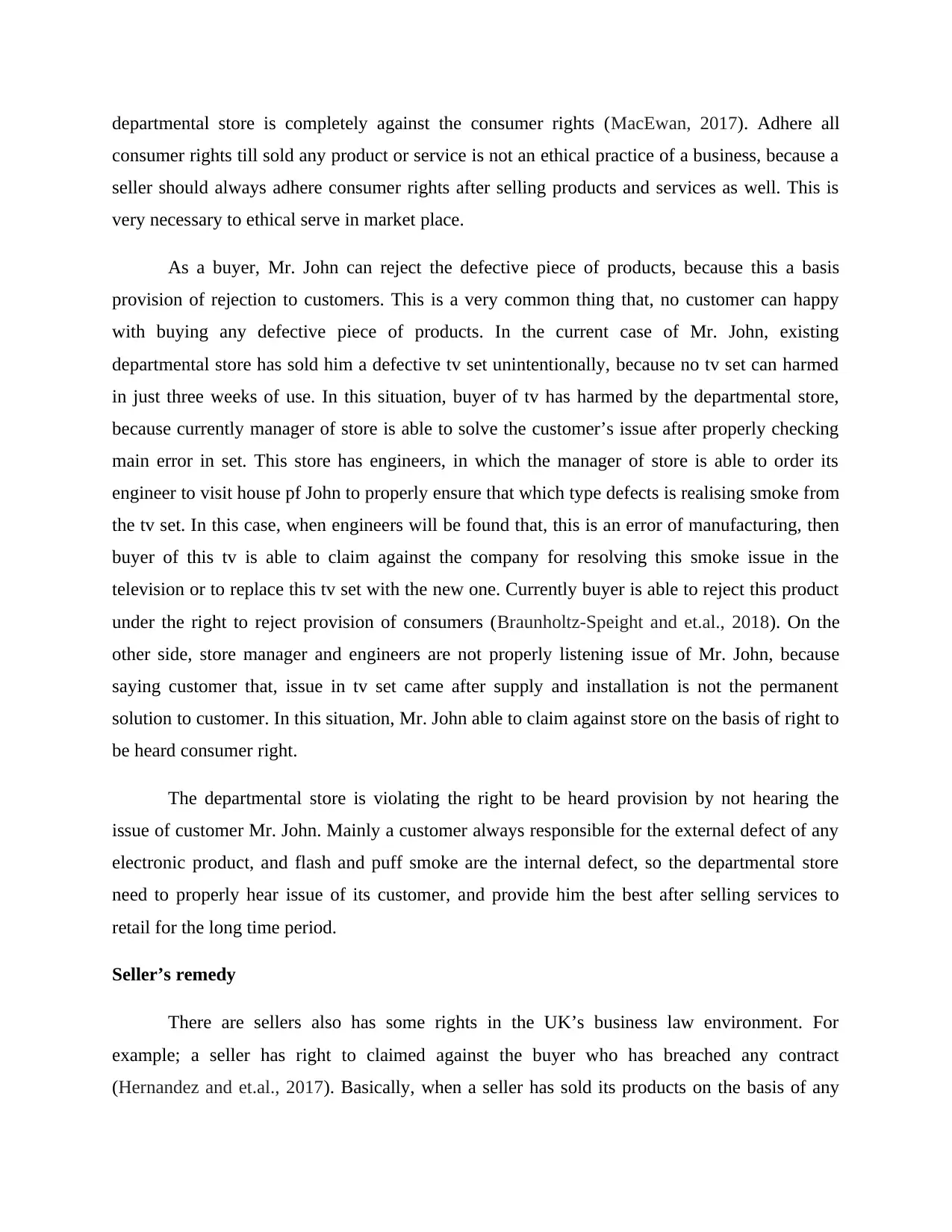
departmental store is completely against the consumer rights (MacEwan, 2017). Adhere all
consumer rights till sold any product or service is not an ethical practice of a business, because a
seller should always adhere consumer rights after selling products and services as well. This is
very necessary to ethical serve in market place.
As a buyer, Mr. John can reject the defective piece of products, because this a basis
provision of rejection to customers. This is a very common thing that, no customer can happy
with buying any defective piece of products. In the current case of Mr. John, existing
departmental store has sold him a defective tv set unintentionally, because no tv set can harmed
in just three weeks of use. In this situation, buyer of tv has harmed by the departmental store,
because currently manager of store is able to solve the customer’s issue after properly checking
main error in set. This store has engineers, in which the manager of store is able to order its
engineer to visit house pf John to properly ensure that which type defects is realising smoke from
the tv set. In this case, when engineers will be found that, this is an error of manufacturing, then
buyer of this tv is able to claim against the company for resolving this smoke issue in the
television or to replace this tv set with the new one. Currently buyer is able to reject this product
under the right to reject provision of consumers (Braunholtz-Speight and et.al., 2018). On the
other side, store manager and engineers are not properly listening issue of Mr. John, because
saying customer that, issue in tv set came after supply and installation is not the permanent
solution to customer. In this situation, Mr. John able to claim against store on the basis of right to
be heard consumer right.
The departmental store is violating the right to be heard provision by not hearing the
issue of customer Mr. John. Mainly a customer always responsible for the external defect of any
electronic product, and flash and puff smoke are the internal defect, so the departmental store
need to properly hear issue of its customer, and provide him the best after selling services to
retail for the long time period.
Seller’s remedy
There are sellers also has some rights in the UK’s business law environment. For
example; a seller has right to claimed against the buyer who has breached any contract
(Hernandez and et.al., 2017). Basically, when a seller has sold its products on the basis of any
consumer rights till sold any product or service is not an ethical practice of a business, because a
seller should always adhere consumer rights after selling products and services as well. This is
very necessary to ethical serve in market place.
As a buyer, Mr. John can reject the defective piece of products, because this a basis
provision of rejection to customers. This is a very common thing that, no customer can happy
with buying any defective piece of products. In the current case of Mr. John, existing
departmental store has sold him a defective tv set unintentionally, because no tv set can harmed
in just three weeks of use. In this situation, buyer of tv has harmed by the departmental store,
because currently manager of store is able to solve the customer’s issue after properly checking
main error in set. This store has engineers, in which the manager of store is able to order its
engineer to visit house pf John to properly ensure that which type defects is realising smoke from
the tv set. In this case, when engineers will be found that, this is an error of manufacturing, then
buyer of this tv is able to claim against the company for resolving this smoke issue in the
television or to replace this tv set with the new one. Currently buyer is able to reject this product
under the right to reject provision of consumers (Braunholtz-Speight and et.al., 2018). On the
other side, store manager and engineers are not properly listening issue of Mr. John, because
saying customer that, issue in tv set came after supply and installation is not the permanent
solution to customer. In this situation, Mr. John able to claim against store on the basis of right to
be heard consumer right.
The departmental store is violating the right to be heard provision by not hearing the
issue of customer Mr. John. Mainly a customer always responsible for the external defect of any
electronic product, and flash and puff smoke are the internal defect, so the departmental store
need to properly hear issue of its customer, and provide him the best after selling services to
retail for the long time period.
Seller’s remedy
There are sellers also has some rights in the UK’s business law environment. For
example; a seller has right to claimed against the buyer who has breached any contract
(Hernandez and et.al., 2017). Basically, when a seller has sold its products on the basis of any
Paraphrase This Document
Need a fresh take? Get an instant paraphrase of this document with our AI Paraphraser
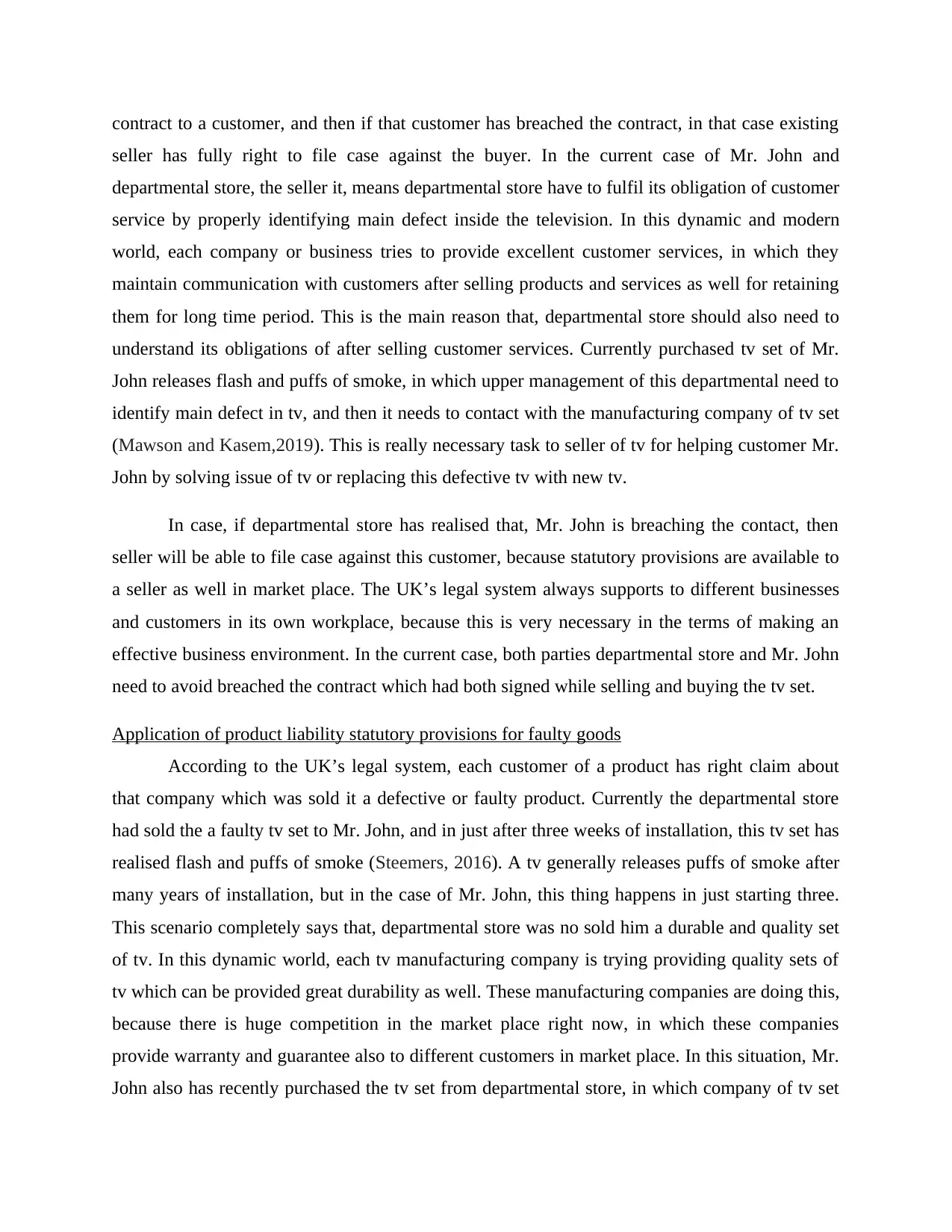
contract to a customer, and then if that customer has breached the contract, in that case existing
seller has fully right to file case against the buyer. In the current case of Mr. John and
departmental store, the seller it, means departmental store have to fulfil its obligation of customer
service by properly identifying main defect inside the television. In this dynamic and modern
world, each company or business tries to provide excellent customer services, in which they
maintain communication with customers after selling products and services as well for retaining
them for long time period. This is the main reason that, departmental store should also need to
understand its obligations of after selling customer services. Currently purchased tv set of Mr.
John releases flash and puffs of smoke, in which upper management of this departmental need to
identify main defect in tv, and then it needs to contact with the manufacturing company of tv set
(Mawson and Kasem,2019). This is really necessary task to seller of tv for helping customer Mr.
John by solving issue of tv or replacing this defective tv with new tv.
In case, if departmental store has realised that, Mr. John is breaching the contact, then
seller will be able to file case against this customer, because statutory provisions are available to
a seller as well in market place. The UK’s legal system always supports to different businesses
and customers in its own workplace, because this is very necessary in the terms of making an
effective business environment. In the current case, both parties departmental store and Mr. John
need to avoid breached the contract which had both signed while selling and buying the tv set.
Application of product liability statutory provisions for faulty goods
According to the UK’s legal system, each customer of a product has right claim about
that company which was sold it a defective or faulty product. Currently the departmental store
had sold the a faulty tv set to Mr. John, and in just after three weeks of installation, this tv set has
realised flash and puffs of smoke (Steemers, 2016). A tv generally releases puffs of smoke after
many years of installation, but in the case of Mr. John, this thing happens in just starting three.
This scenario completely says that, departmental store was no sold him a durable and quality set
of tv. In this dynamic world, each tv manufacturing company is trying providing quality sets of
tv which can be provided great durability as well. These manufacturing companies are doing this,
because there is huge competition in the market place right now, in which these companies
provide warranty and guarantee also to different customers in market place. In this situation, Mr.
John also has recently purchased the tv set from departmental store, in which company of tv set
seller has fully right to file case against the buyer. In the current case of Mr. John and
departmental store, the seller it, means departmental store have to fulfil its obligation of customer
service by properly identifying main defect inside the television. In this dynamic and modern
world, each company or business tries to provide excellent customer services, in which they
maintain communication with customers after selling products and services as well for retaining
them for long time period. This is the main reason that, departmental store should also need to
understand its obligations of after selling customer services. Currently purchased tv set of Mr.
John releases flash and puffs of smoke, in which upper management of this departmental need to
identify main defect in tv, and then it needs to contact with the manufacturing company of tv set
(Mawson and Kasem,2019). This is really necessary task to seller of tv for helping customer Mr.
John by solving issue of tv or replacing this defective tv with new tv.
In case, if departmental store has realised that, Mr. John is breaching the contact, then
seller will be able to file case against this customer, because statutory provisions are available to
a seller as well in market place. The UK’s legal system always supports to different businesses
and customers in its own workplace, because this is very necessary in the terms of making an
effective business environment. In the current case, both parties departmental store and Mr. John
need to avoid breached the contract which had both signed while selling and buying the tv set.
Application of product liability statutory provisions for faulty goods
According to the UK’s legal system, each customer of a product has right claim about
that company which was sold it a defective or faulty product. Currently the departmental store
had sold the a faulty tv set to Mr. John, and in just after three weeks of installation, this tv set has
realised flash and puffs of smoke (Steemers, 2016). A tv generally releases puffs of smoke after
many years of installation, but in the case of Mr. John, this thing happens in just starting three.
This scenario completely says that, departmental store was no sold him a durable and quality set
of tv. In this dynamic world, each tv manufacturing company is trying providing quality sets of
tv which can be provided great durability as well. These manufacturing companies are doing this,
because there is huge competition in the market place right now, in which these companies
provide warranty and guarantee also to different customers in market place. In this situation, Mr.
John also has recently purchased the tv set from departmental store, in which company of tv set
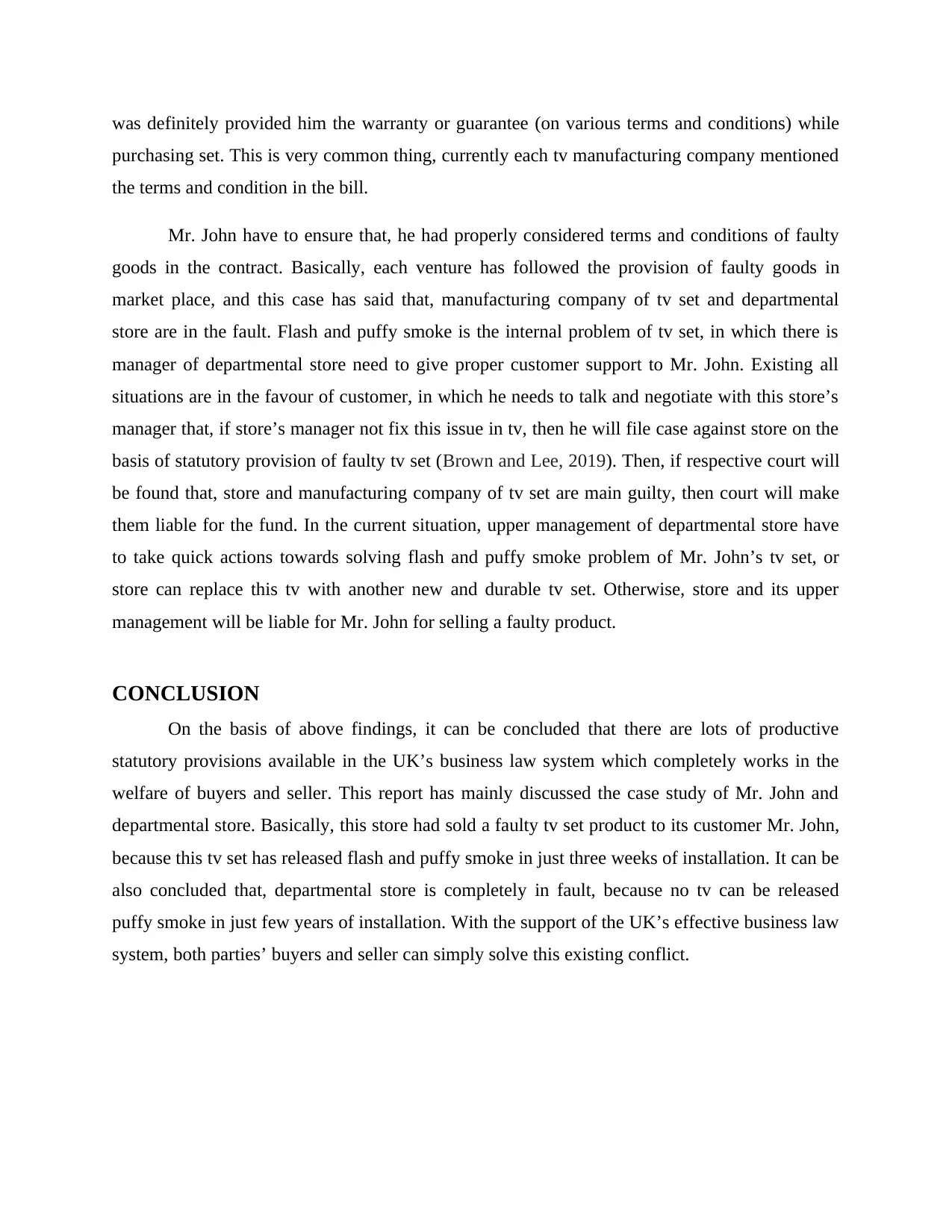
was definitely provided him the warranty or guarantee (on various terms and conditions) while
purchasing set. This is very common thing, currently each tv manufacturing company mentioned
the terms and condition in the bill.
Mr. John have to ensure that, he had properly considered terms and conditions of faulty
goods in the contract. Basically, each venture has followed the provision of faulty goods in
market place, and this case has said that, manufacturing company of tv set and departmental
store are in the fault. Flash and puffy smoke is the internal problem of tv set, in which there is
manager of departmental store need to give proper customer support to Mr. John. Existing all
situations are in the favour of customer, in which he needs to talk and negotiate with this store’s
manager that, if store’s manager not fix this issue in tv, then he will file case against store on the
basis of statutory provision of faulty tv set (Brown and Lee, 2019). Then, if respective court will
be found that, store and manufacturing company of tv set are main guilty, then court will make
them liable for the fund. In the current situation, upper management of departmental store have
to take quick actions towards solving flash and puffy smoke problem of Mr. John’s tv set, or
store can replace this tv with another new and durable tv set. Otherwise, store and its upper
management will be liable for Mr. John for selling a faulty product.
CONCLUSION
On the basis of above findings, it can be concluded that there are lots of productive
statutory provisions available in the UK’s business law system which completely works in the
welfare of buyers and seller. This report has mainly discussed the case study of Mr. John and
departmental store. Basically, this store had sold a faulty tv set product to its customer Mr. John,
because this tv set has released flash and puffy smoke in just three weeks of installation. It can be
also concluded that, departmental store is completely in fault, because no tv can be released
puffy smoke in just few years of installation. With the support of the UK’s effective business law
system, both parties’ buyers and seller can simply solve this existing conflict.
purchasing set. This is very common thing, currently each tv manufacturing company mentioned
the terms and condition in the bill.
Mr. John have to ensure that, he had properly considered terms and conditions of faulty
goods in the contract. Basically, each venture has followed the provision of faulty goods in
market place, and this case has said that, manufacturing company of tv set and departmental
store are in the fault. Flash and puffy smoke is the internal problem of tv set, in which there is
manager of departmental store need to give proper customer support to Mr. John. Existing all
situations are in the favour of customer, in which he needs to talk and negotiate with this store’s
manager that, if store’s manager not fix this issue in tv, then he will file case against store on the
basis of statutory provision of faulty tv set (Brown and Lee, 2019). Then, if respective court will
be found that, store and manufacturing company of tv set are main guilty, then court will make
them liable for the fund. In the current situation, upper management of departmental store have
to take quick actions towards solving flash and puffy smoke problem of Mr. John’s tv set, or
store can replace this tv with another new and durable tv set. Otherwise, store and its upper
management will be liable for Mr. John for selling a faulty product.
CONCLUSION
On the basis of above findings, it can be concluded that there are lots of productive
statutory provisions available in the UK’s business law system which completely works in the
welfare of buyers and seller. This report has mainly discussed the case study of Mr. John and
departmental store. Basically, this store had sold a faulty tv set product to its customer Mr. John,
because this tv set has released flash and puffy smoke in just three weeks of installation. It can be
also concluded that, departmental store is completely in fault, because no tv can be released
puffy smoke in just few years of installation. With the support of the UK’s effective business law
system, both parties’ buyers and seller can simply solve this existing conflict.
⊘ This is a preview!⊘
Do you want full access?
Subscribe today to unlock all pages.

Trusted by 1+ million students worldwide
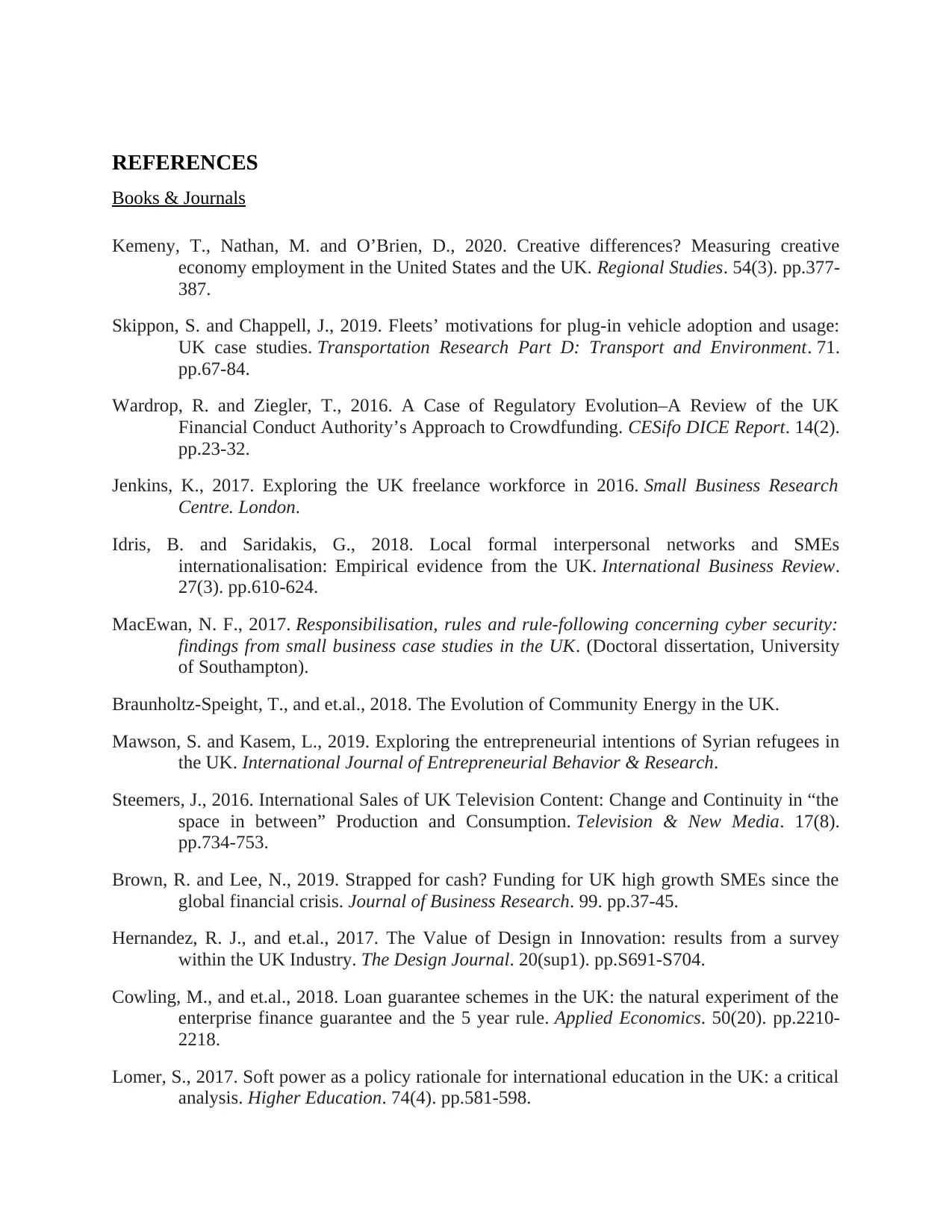
REFERENCES
Books & Journals
Kemeny, T., Nathan, M. and O’Brien, D., 2020. Creative differences? Measuring creative
economy employment in the United States and the UK. Regional Studies. 54(3). pp.377-
387.
Skippon, S. and Chappell, J., 2019. Fleets’ motivations for plug-in vehicle adoption and usage:
UK case studies. Transportation Research Part D: Transport and Environment. 71.
pp.67-84.
Wardrop, R. and Ziegler, T., 2016. A Case of Regulatory Evolution–A Review of the UK
Financial Conduct Authority’s Approach to Crowdfunding. CESifo DICE Report. 14(2).
pp.23-32.
Jenkins, K., 2017. Exploring the UK freelance workforce in 2016. Small Business Research
Centre. London.
Idris, B. and Saridakis, G., 2018. Local formal interpersonal networks and SMEs
internationalisation: Empirical evidence from the UK. International Business Review.
27(3). pp.610-624.
MacEwan, N. F., 2017. Responsibilisation, rules and rule-following concerning cyber security:
findings from small business case studies in the UK. (Doctoral dissertation, University
of Southampton).
Braunholtz-Speight, T., and et.al., 2018. The Evolution of Community Energy in the UK.
Mawson, S. and Kasem, L., 2019. Exploring the entrepreneurial intentions of Syrian refugees in
the UK. International Journal of Entrepreneurial Behavior & Research.
Steemers, J., 2016. International Sales of UK Television Content: Change and Continuity in “the
space in between” Production and Consumption. Television & New Media. 17(8).
pp.734-753.
Brown, R. and Lee, N., 2019. Strapped for cash? Funding for UK high growth SMEs since the
global financial crisis. Journal of Business Research. 99. pp.37-45.
Hernandez, R. J., and et.al., 2017. The Value of Design in Innovation: results from a survey
within the UK Industry. The Design Journal. 20(sup1). pp.S691-S704.
Cowling, M., and et.al., 2018. Loan guarantee schemes in the UK: the natural experiment of the
enterprise finance guarantee and the 5 year rule. Applied Economics. 50(20). pp.2210-
2218.
Lomer, S., 2017. Soft power as a policy rationale for international education in the UK: a critical
analysis. Higher Education. 74(4). pp.581-598.
Books & Journals
Kemeny, T., Nathan, M. and O’Brien, D., 2020. Creative differences? Measuring creative
economy employment in the United States and the UK. Regional Studies. 54(3). pp.377-
387.
Skippon, S. and Chappell, J., 2019. Fleets’ motivations for plug-in vehicle adoption and usage:
UK case studies. Transportation Research Part D: Transport and Environment. 71.
pp.67-84.
Wardrop, R. and Ziegler, T., 2016. A Case of Regulatory Evolution–A Review of the UK
Financial Conduct Authority’s Approach to Crowdfunding. CESifo DICE Report. 14(2).
pp.23-32.
Jenkins, K., 2017. Exploring the UK freelance workforce in 2016. Small Business Research
Centre. London.
Idris, B. and Saridakis, G., 2018. Local formal interpersonal networks and SMEs
internationalisation: Empirical evidence from the UK. International Business Review.
27(3). pp.610-624.
MacEwan, N. F., 2017. Responsibilisation, rules and rule-following concerning cyber security:
findings from small business case studies in the UK. (Doctoral dissertation, University
of Southampton).
Braunholtz-Speight, T., and et.al., 2018. The Evolution of Community Energy in the UK.
Mawson, S. and Kasem, L., 2019. Exploring the entrepreneurial intentions of Syrian refugees in
the UK. International Journal of Entrepreneurial Behavior & Research.
Steemers, J., 2016. International Sales of UK Television Content: Change and Continuity in “the
space in between” Production and Consumption. Television & New Media. 17(8).
pp.734-753.
Brown, R. and Lee, N., 2019. Strapped for cash? Funding for UK high growth SMEs since the
global financial crisis. Journal of Business Research. 99. pp.37-45.
Hernandez, R. J., and et.al., 2017. The Value of Design in Innovation: results from a survey
within the UK Industry. The Design Journal. 20(sup1). pp.S691-S704.
Cowling, M., and et.al., 2018. Loan guarantee schemes in the UK: the natural experiment of the
enterprise finance guarantee and the 5 year rule. Applied Economics. 50(20). pp.2210-
2218.
Lomer, S., 2017. Soft power as a policy rationale for international education in the UK: a critical
analysis. Higher Education. 74(4). pp.581-598.
Paraphrase This Document
Need a fresh take? Get an instant paraphrase of this document with our AI Paraphraser
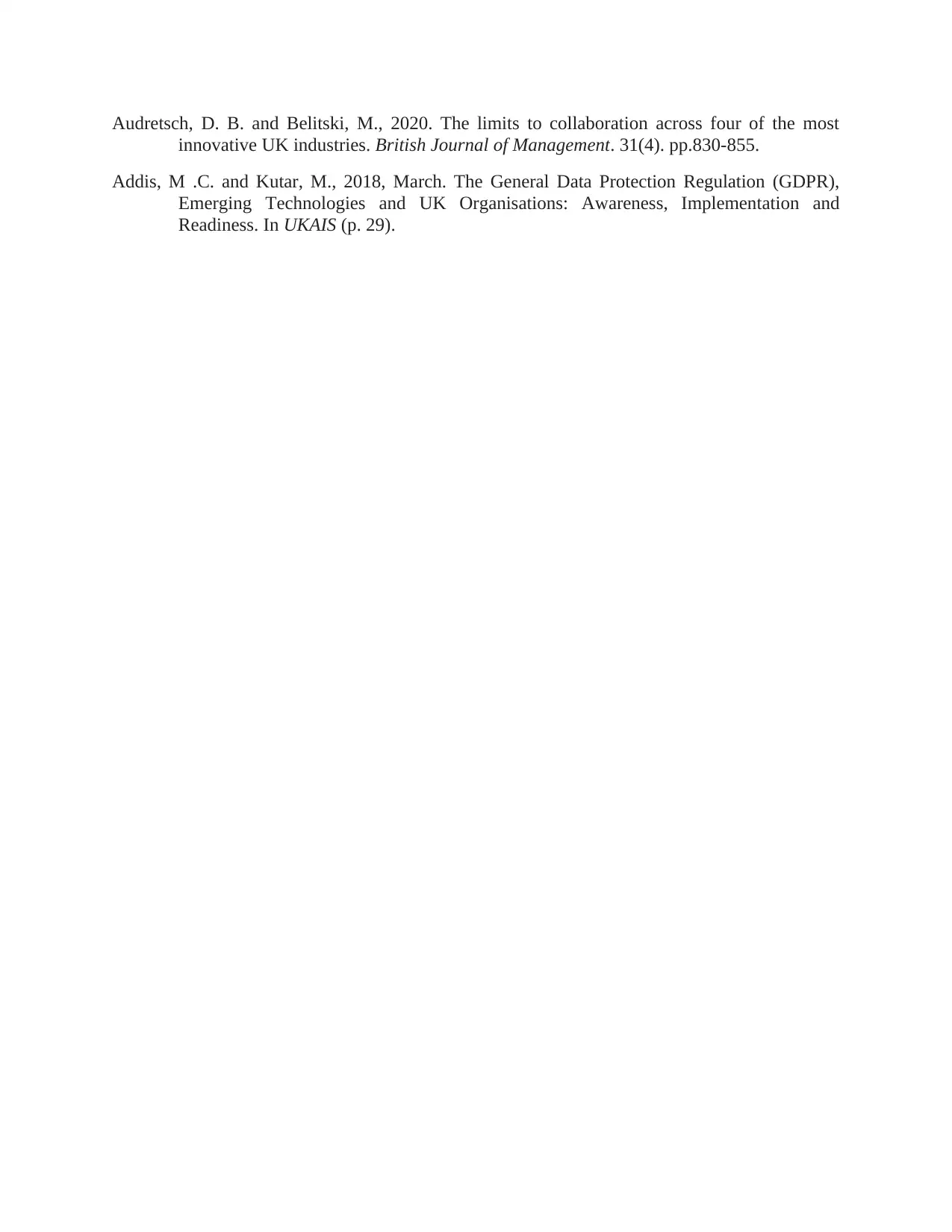
Audretsch, D. B. and Belitski, M., 2020. The limits to collaboration across four of the most
innovative UK industries. British Journal of Management. 31(4). pp.830-855.
Addis, M .C. and Kutar, M., 2018, March. The General Data Protection Regulation (GDPR),
Emerging Technologies and UK Organisations: Awareness, Implementation and
Readiness. In UKAIS (p. 29).
innovative UK industries. British Journal of Management. 31(4). pp.830-855.
Addis, M .C. and Kutar, M., 2018, March. The General Data Protection Regulation (GDPR),
Emerging Technologies and UK Organisations: Awareness, Implementation and
Readiness. In UKAIS (p. 29).
1 out of 11
Related Documents
Your All-in-One AI-Powered Toolkit for Academic Success.
+13062052269
info@desklib.com
Available 24*7 on WhatsApp / Email
![[object Object]](/_next/static/media/star-bottom.7253800d.svg)
Unlock your academic potential
Copyright © 2020–2026 A2Z Services. All Rights Reserved. Developed and managed by ZUCOL.




